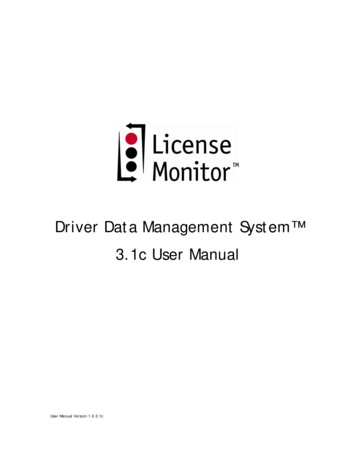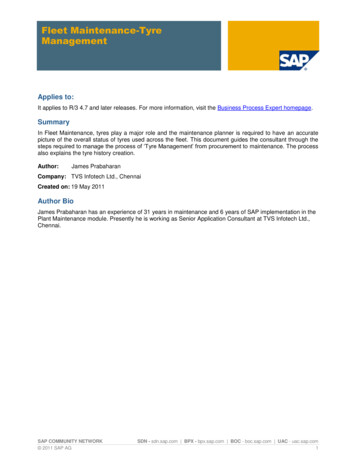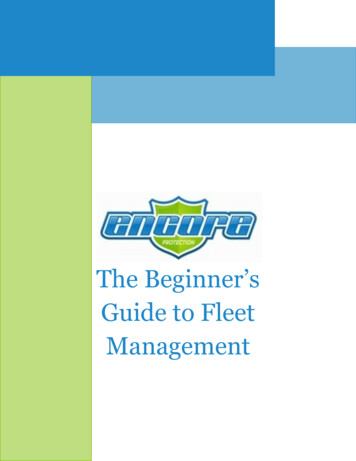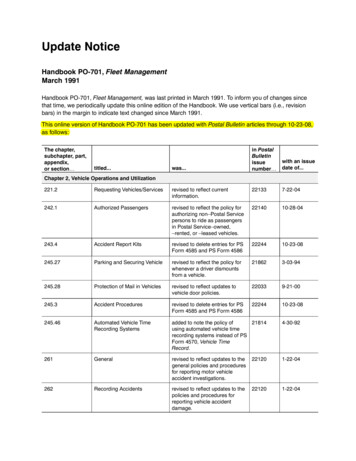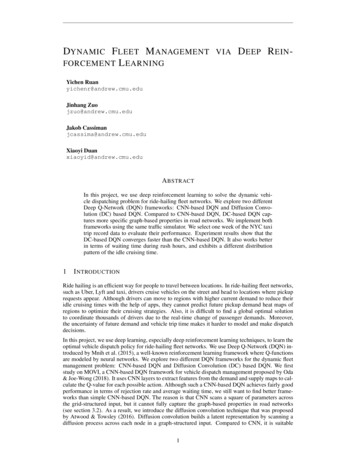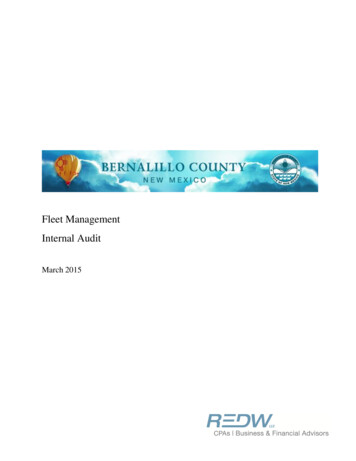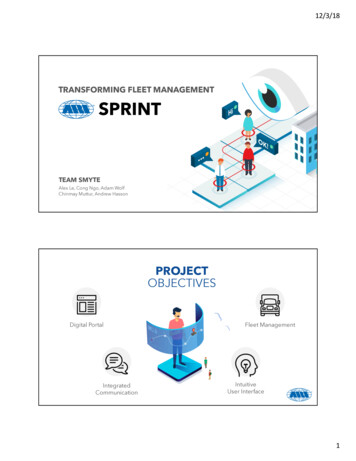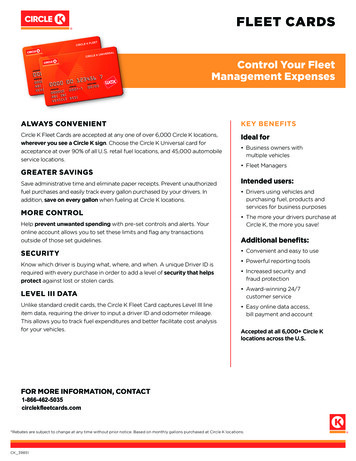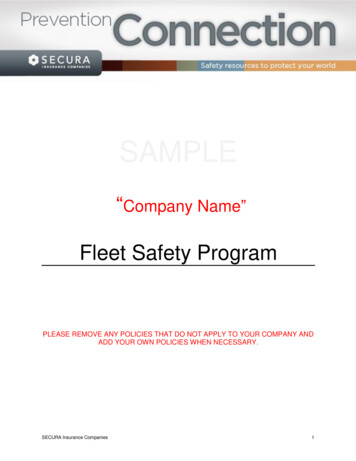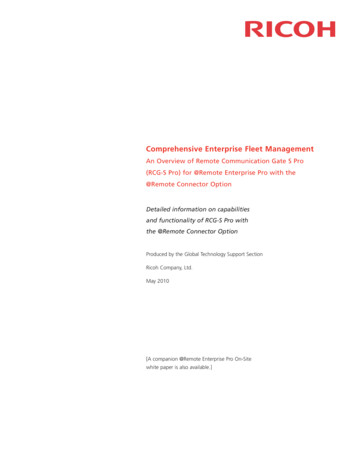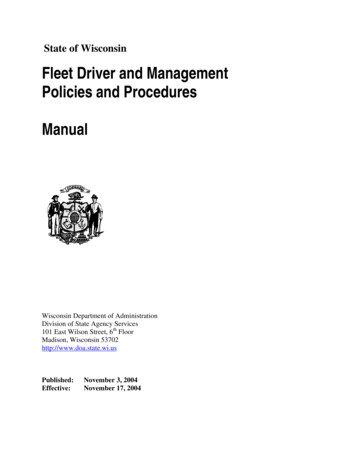
Transcription
State of WisconsinFleet Driver and ManagementPolicies and ProceduresManualWisconsin Department of AdministrationDivision of State Agency Services101 East Wilson Street, 6th FloorMadison, Wisconsin :November 3, 2004November 17, 2004State of Wisconsin Fleet Driver and Management Policies and Procedures Manual1
Table of ContentsExecutive Summary1PrefaceAuthorityDefinitions of Terms23Chapter One: Fleet Driver PoliciesWho May Drive a State Vehicle1.1.Minimum Standards for Driving a State Vehicle1.2.Vehicle Use Agreements1.3.Driver Disqualification1.4.Special Certifications1.5.Commercial Driver License (CDL) Requirements55566Using a State Vehicle1.6.Permitted and Prohibited Uses1.7.Personal Use of State Vehicles1.8.Political Use of State Vehicles and Aircraft1.9.Incidental Travel and Stops1.10. Reimbursing Personal Miles to the State1.11. Mileage Reporting1.12. Riding in a State Vehicle1.13. Extended Use1.14. Citations1.15. Motor Pool Service Charges1.16. State Vehicle Related Purchases1.17. Vehicle Fuel Policies and Fuel Card Uses1.18. Repairs, Preventive Maintenance and Recalls788891011111111111212Vehicle Assignments1.19. Vehicle Assignment Regulations1.20. Personally Assigned Vehicles1.21. Work Shared Vehicles1.22. Motor Pool Vehicles1.23. Qualified Non-Personal Use Vehicles1.24. Privately Owned Vehicles Used in State Business131314141415Accidents and Liability1.25. Driver Procedure1.26. Property and Liability Protection1.27. Worker’s Compensation Coverage1.28. Property Coverage – State Vehicles and State Rentals Over 30 Days1.29. Liability Coverage1.30. Privately Owned Vehicles1.31. State Vanpool Program15171717171818State of Wisconsin Fleet Driver and Management Policies and Procedures Manuali
Chapter Two: Fleet Management PoliciesFleet Manager Responsibilities2.1.Department of Administration Responsibilities2.2.Agency Responsibilities2.3.Fleet Manager2.4.Fleet Coordinator2.5.Driver Supervisor2.6.Required Training191919192020Driver Management2.7.Approving Vehicle Use Agreements2.8.Monitoring Vehicle Use Agreements2.9.Personal Use of State Vehicles: See Chapter One, 1.7.2.10. Political Use of State Vehicles and Aircraft: See Chapter One, 1.8.2.11. Incidental Travel and Stops: See Chapter One, 1.9.2.12. Reimbursing Personal Miles to the State: See Chapter One, 1.10.202121212122Vehicle Management2.13. Vehicle Assignments2.14. Personally Assigned Vehicles2.15. Work Shared Vehicles2.16. Motor Pool Vehicles2.17. Qualified Non-Personal Use Vehicles2.18. Vehicle Maintenance Policies2.19. Vehicle Fuel Policies and Fuel Card Uses: See Chapter One, 1.15.2.20. Plain Plate Requirements2222222323232425Accidents and Emergencies2.21. Driver Procedures: Chapter One, 1.25.2.22. Agency Risk Manager or Repair Coordinator2.23. Repair/Accident Coordinator Procedure2.24. Driver Claims-Recovery of Losses25252526Records Management2.25. Record Keeping and Reviews2.26. Mileage Reports2.27. Fleet Related Record Retention2.28. FleetAnywhere Database Reports2.29. Public Records Requests and Special Reports2.30. Lease and Rental Rates2.31. Citizen Driver Complaints27282829303030Appendix Directory30State of Wisconsin Fleet Driver and Management Policies and Procedures Manualii
Executive SummaryThis manual combines into a single document the policies and procedures previously published separatelyas the Fleet Drivers Policies and the Fleet Management Policies. The Department of Administration(DOA) has chosen to consolidate the policies to (1) align more closely the use and management of Statevehicles, (2) eliminate confusion between previous versions, (3) increase employee and publicunderstanding of the overall state fleet program and (4) provide for greater accountability of fleet policies.The following overview provides a general sense of the state fleet policies. However, the reader shouldthoroughly read Chapters One (fleet drivers) and Two (fleet managers) of the manual for a clearunderstanding of enforceable policies.Fleet Driver Only state employees, authorized University of Wisconsin System students and other authorizedagents of the state may drive a state vehicle. All drivers must meet minimum standards andexecute an approved Vehicle Use Agreement.Authorization to drive a state vehicle may be denied or revoked if the employee, student oragent’s driving record reflects certain violations.Use of a state vehicle must be for official state business only. Incidental use associated withofficial business is strictly limited.State vehicles shall not be used for personal purposes except commuting under strictly limitedcircumstances.An employee must reimburse the state for personal miles traveled and adhere to all IRS reportingrequirements.Non-state employees may ride in a state vehicle only if authorized and on official state business.Drivers and passengers must comply with all Wisconsin laws. Drivers are responsible for payingall vehicle citations.Employees should use a state vehicle whenever a vehicle is required and available for conductingstate business. State vehicles are categorized as personally assigned, work shared, motor pool andqualified non-personal use vehicles.Drivers are responsible for immediately reporting all accidents or any damage to state vehicles.Fleet Management DOA is responsible for developing uniform state policies for vehicle acquisition, use andmaintenance.State agencies must adhere to DOA policies. Any deviations must be authorized in writing by theDOA Secretary.All driving records of employees with active Vehicle Use Agreements will be reviewed annually.Agencies may void agreements of any employee that fails to meet minimum driving standards.Fleet managers/coordinators are mandated to monitor the assignment and use of vehicles by allagency employees on a semi-annual basis (or more frequently if necessary) and submit a completereport to the DOA Secretary.Fleet managers will develop and maintain a preventative maintenance program and procedures forunscheduled maintenance.All state vehicles are required to have red state-owned license plates (with the exception ofvehicles authorized by DOA; for instance, undercover law enforcement).All agencies are required to report their vehicle information in the FleetAnywhere database.State of Wisconsin Fleet Driver and Management Policies and Procedures Manual1
PrefaceAuthorityThe Fleet Drivers and Management Policies and Procedures Manual is based on the collection of statutes,administrative codes, memoranda and collective bargaining agreements that govern the use of statevehicles. DOA approved and issued this Fleet Drivers and Management Policies and Procedures Manualto control the use of all state vehicles. Fleet policies reflect minimum requirements that state agencies anddrivers must abide by to use vehicles owned by the State of Wisconsin.This manual provides drivers with the basic regulatory requirements for operating a vehicle owned by theState of Wisconsin. It also provides agencies with the basic regulatory requirements for managing avehicle owned by the State of Wisconsin.It is each driver’s responsibility to obtain supervisory approval to travel. Authority to travel—both in stateand out-of-state—is regulated. Statutes authorizing employees to travel for state business are contained inChapters 16 and 20, Wisconsin Statutes. A number of collective bargaining agreements also containprovisions relating to travel and state vehicle usage. Drivers should consult with fleet managers regardingthose provisions.Likewise, the laws granting state government the authority to own and operate a fleet of vehicles arecontained in Wisconsin Statutes and Administrative Codes. The following statutes and rules are amongthose that govern the use and management of the State fleet:s. 11.37s. 16.003(1)s. 16.04s. 16.045s. 16.70(le)s. 16.70(2)s. 20.505(2)(k)s. 20.915s. 20.916s. 20.916(4)s. 20.916(7)s. 20.916(8)s. 20.916(9)c. 102s.340.01(41g)s. 341.14(3)s. 893.82s. 895.46Travel by public officersDepartment of Administration-Purpose (Enterprise Fleet Management)Fleet management and maintenanceStorage and use of gasohol and alternative fuelsDefinition of “agency”Definition of “authority”Risk management (State Self-funded Property and Liability Program)State motor vehicles and aircraftTraveling expenses (Uniform Travel Schedule Amounts governed by this statute)Use of privately owned automobilesPersonal use of state vehicles and aircraftUniform travel schedule amounts; allowancesReimbursement for travel expensesConditions of liabilityOperator’s licensePrivate plates for law enforcement vehiclesClaims against state employees; notice of claim; limitation of damagesState and political subdivisions thereof to pay judgements taken against officersState of Wisconsin Fleet Driver and Management Policies and Procedures Manual2
Definitions of TermsAgency: State departments, boards, commissions, institutions, and University campuses, except agencyheads.Agency Dispatcher: The agency employee who reserves and issues pool vehicles.Agency Fleet Coordinator: The employee in a state agency who manages vehicles leased from DOA.Agencies that lease vehicles instead of owning them have a Fleet Coordinator instead of a Fleet Manager.Agency Fleet Manager: The employee who manages an agency's owned vehicle assets.Agency Head: The head of a department (secretary), board (chairperson), commission (commissioner), oruniversity campus (chancellor). Agency heads may delegate their duties to an appropriate agencyemployee. Delegation of duties must be documented and a copy filed with the DOA Bureau of EnterpriseFleet Director.Agency Risk Manager: A state employee whose responsibilities involve administering the agency’s riskmanagement program.Agency Supervisor: An agency employee who monitors the driver’s compliance regarding mileage reports,fuel usage and maintenance issues and reports to the agency fleet manager/coordinator.ADA: Americans with Disabilities ActAuthority: Wisconsin state agency with administrative powers regarding enforcement of policycompliance by other state agencies. DOA has authority over fleet driver fleet management policies.BSRM: DOA Bureau of State Risk Management.Business Miles: Miles driven in state vehicles by state employees, while performing official state business.Commuting: Direct travel from home to headquarters or headquarters to home.DOA: Department of AdministrationDUI: Driving Under the Influence of an intoxicant, controlled substance or other drug.Employing Agency: The board, commission, committee, council, university campus, or department in stategovernment that appointed an employee to the employee's current state position (or the employee'sposition at the time in question).Headquarters City: The area within the city, town or village limits where an employee’s permanent worksite is located and the area within a radius of 15 miles (based on odometer mileage) from the employee’spermanent work site.Home: The employee's place of residence.Incidental Use: Typically occurs while enroute on official business. Stops at an ATM or financialinstitutions or for lunch would qualify as incidental use and are not considered personal miles if in workstatus and do not require reimbursement. Incidental use may also occur during commuting when personalmiles are to be reimbursed. During commuting, mileage for incidental use must be reimbursed.State of Wisconsin Fleet Driver and Management Policies and Procedures Manual3
IRS: U.S. Internal Revenue ServiceMotor Pool: Motor pool vehicles are available to all employees without regard to funding source, and arebilled back on a daily use basis to the appropriate funding source.Non-availability Slips: Written authorization to use an employee's private vehicle at the reimbursement ratestated in the current UTSA.On-Call: Generally, when the Employer requires that an employee must be available for work and able toreport for work in less than one hour. Definition of “on-call” may vary between collective bargainingagreements/Compensation Plan and may also be called “standby.”Operator’s License: Defined in s. 340.01(41g), Wis. Stats.OSER: Office of State Employment RelationsOWI: Operating While Intoxicated, i.e., under the influence of an intoxicant, controlled substance or otherdrug.Owner Agency: The board, commission, committee, council, university campus, or department in stategovernment that owns the vehicle.Personal Miles: Miles driven in a state vehicle that are not business-related. Commuting is an example ofpersonal miles.Personally Assigned Vehicle: A state vehicle assigned to an individual state employee for business use.Pool Vehicle: A work shared vehicle available for business use through reservation.Qualified Non-Personal Use Vehicle: Those vehicles used primarily by law enforcement or fire fightingpersonnel. See Chapter One, 1.23., for a complete definition.Reimbursement rate: The rates at which an employee may be reimbursed for use of a personal vehicle forstate business, or the rate at which an employee is required to reimburse the State for personal miles in astate vehicle. For rates, please refer to the current UTSA. If an employee exercises the option to use apersonal vehicle when an assigned or pool vehicle is available, the reimbursement rate is set in accordancewith s. 20.916(4)(e), Wis. Stats., unless provided otherwise in the UTSA.SBOP: DOA State Bureau of ProcurementState Vehicle: A vehicle owned by the State of Wisconsin for use to conduct official state business. A statevehicle also includes a commercially leased or rented vehicle that is assigned to an individual, agency orbusiness sub unit for use to conduct official state business.UTSA: The most recent Uniform Travel Schedule Amount (UTSA) set by OSER with approval by thelegislative Joint Committee on Employment Relations. UTSAs are found in the Compensation Plan.Vehicle Assignment Transfer (VAT): An authorization to change vehicle assignment status.Vehicle Use Agreement (VUA): An agreement signed by a driver of state vehicles and his/her supervisorindicating the employee is eligible to drive a state vehicle.Work Shared Vehicle: A state vehicle assigned to an agency or an agency sub-unit for business use.State of Wisconsin Fleet Driver and Management Policies and Procedures Manual4
Chapter One: Fleet Driver PoliciesWho May Drive a State Vehicle1.1. Minimum Standards for Driving a State VehicleOnly state employees, authorized University of Wisconsin System students and other authorized agents ofthe state who sign a Vehicle Use Agreement (VUA) may drive state vehicles. They may only use statevehicles if they are on official state business, meet minimum driving standards and are authorized by theiragency risk manager. Approval will be documented and kept on file at the state agency risk managementoffice. If the agency does not have a risk manager, the request for authorization should be submitted fromthe agency head of the employing agency to the BSRM for approval.State employees, authorized University of Wisconsin System students and other authorized agents of thestate may be allowed to drive a state vehicle if the following minimum standards are met and approved bytheir employing agency: Must have a valid operator’s license,Must have minimum of two years licensed driving experience, andMust be eighteen (18) years of age.Agency fleet managers/coordinators should consult with their agency risk managers regarding anyrequests for an exception to the minimum standards. Approval will be documented and kept on file at thestate agency risk management office. If the agency does not have a risk manager, the request forexception should be submitted from the agency head of the employing agency to the BSRM for approval.Drivers denied the use of a state vehicle based on an unsatisfactory driving record may request a review ofthe denial by their agency head.1.2. Vehicle Use AgreementsAll drivers must sign a Vehicle Use Agreement (VUA), DOA-3103 or equivalent (Appendix I) and submitthe completed VUA to their supervisor for approval prior to operating a state vehicle. The VUA shall bereviewed and forwarded by the agency fleet manager/coordinator to the owner agency. The VUAdescribes the State’s minimum standards for driving a state vehicle. All drivers who use state vehicles willhave their driving records reviewed annually. It is the driver’s responsibility to immediately notify thesupervisor and agency fleet manager/coordinator of any changes or updates in their driving record.Prior to driving a state vehicle, each driver shall obtain a copy of and become thoroughly familiar with thePreface and Chapter One of the Fleet Driver and Management Policies and Procedures Manual. Oncedrivers sign the VUA, or equivalent, they acknowledge an understanding of and future compliance withthe directives in this manual. Any failure to comply with the Fleet Driver Policies and Procedures will bereviewed by the driver’s supervisor and may be considered a violation of work rules resulting in a loss ofstate vehicle driving privileges and possible discipline, up to and including discharge. Any questionsshould be directed to the driver’s agency fleet manager.1.3. Driver DisqualificationState employees, authorized University of Wisconsin System students and other authorized agents of thestate may not drive a state vehicle if their driving record reflects any of the following conditions:State of Wisconsin Fleet Driver and Management Policies and Procedures Manual5
Three or more moving violations and/or at-fault accidents in the past two yearsAn Operating While Intoxicated (OWI)/Driving Under the Influence (DUI) citation within 12 months Suspension or revocation of driver’s licenseThe violation occurs when the citation is issued, not when the final court decision is made. Exceptions tothis policy are subject to a review. Agency fleet managers/coordinators should consult with their agencyrisk managers regarding any requests for an exception. Approval will be documented and kept on file atthe state agency risk management office. If the agency does not have a risk manager, the request forexception should be submitted from the agency head of the employing agency to the BSRM for approval.Drivers denied the use of a state vehicle based on an unsatisfactory driving record may request a review ofthe denial by their agency head.Drivers must inform their supervisor and agency fleet manager/coordinator in writing whenever theybecome disqualified under these policies. Changes include, but are not limited to, OWI/DUI citation,license revocation, restriction or suspension. Any change in the status of a driver’s record resulting indisqualification or the failure to report such change may result in revocation of the privilege of driving astate vehicle and/or discipline up to and including discharge.1.4. Special CertificationsDepending upon the type of vehicle driven, special training and/or licensing may be required prior tovehicle use. For example, training is required for driver certification for the operation of twelve and 15passenger vans. Commercial Drivers Licenses (CDL) are also required for certain state positions (seeChapter One, 1.5.). Drivers should consult with the agency fleet manager, risk manager or BSRM todetermine eligibility.1.5. Commercial Driver License (CDL) RequirementsUnder s. 340.01, Wis. Stats., a commercial driver’s license is required to operate certain commercial motorvehicles (CMV). The following CMV and CDL guide is provided by the Wisconsin Department ofTransportation (WisDOT): A combination vehicle 26,001 or more pounds is a Class "A" CMV only if the trailer being towed hasa gross vehicle weight rated, registered weight or actual gross weight of more than 10,000 pounds.When the weight of the combination vehicle is exactly 26,000 pounds, it is not a CMV and does notrequire a CDL. Example: A tractor weights 16,000 p
Nov 03, 2004 · The Fleet Drivers and Management Policies and Procedures Manual is based on the collection of statutes, administrative codes, memoranda and collective bargaining agreements that govern the use of state vehicles. DOA approved and issued this Fleet Drivers and Management Policies and Pr

